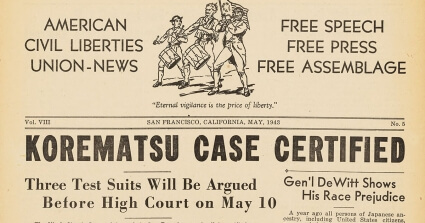Korematsu, Harris, and the Existential Threat to American Ideals
by
Big Jolly Politics
Sep 11, 2024

When people ask me what the worst U.S. Supreme Court decision of all time is, they often expect me, as someone staunchly pro-life, to point to Roe v. Wade. That assumption makes sense on the surface, given the pressure my family and I faced from the medical community to abort our two boys. But while Roe was a deeply consequential decision, the worst Supreme Court ruling in my view is Korematsu v. United States.
Imfamous decisions like Dred Scott, Plessy, and Roe refused to extend rights to marginalized groups, operateing within the flawed framework of existing societal norms or law. Korematsu, however, represents something more sinister — a violation of the rights of a known innocent individual, which is particularly egregious because it so blatantly contradicted foundational American principles.
Korematsu was diametrically opposed to what we are as a country. The decision undermined the concept of inalienable rights that are supposed to be protected regardless of circumstance. The fact that this decision wasn’t based on a complex legal debate about who had rights but rather took rights away from those who already had them makes it stand out as particularly destructive to the fabric of our country.
The lessons of Korematsu seem lost in our current political climate, where emotional appeal takes precidence over the seriousness of the threats to our core principles.
Vice President Harris stands as the standard bearer of changing from engaging in the marketplace of ideas to assault on the marketplace of ideas. Before her, President Obama spoke of those who “cling to guns and religion.” Clinton took it further describing us as a “basket of deplorables.” Harris, though, has made the transition from words to action.
While political figures have long used inflammatory language, what sets Harris apart is her willingness to move from rhetoric to direct action—both in the form of government power and personal involvement—that threatens the core principles of free discourse and civil society.
Her actions are demonstrated through both her prosecutorial history as well as her personal actions. As California’s Attorney General she attempted to punish speech she disagreed with, such as the prosecution of David Daleiden.
She also attempted to compel speech, supported and helped defend the Reproductive FACT Act (2015), a California law that required pro-life crisis pregnancy centers to provide information about state-funded abortion services. Again, she was using her political position to not only punish those she disagreed with, but in this instance to compel them to speak against their beliefs.
Punishing and quieting dissenting viewpoints wasn’t enough. She sought to dictate the marketplace of ideas by compelling speech into the marketplace under color of authority on pains of penal code enforcement.
Her actions aren’t limited to her official actions. She also used her status to help in a personal way to fundraise for bail for rioters in Minneapolis following George Floyd’s death. This reveals a willingness to support lawlessness and intimidation to achieve political ends.
These were not merely peaceful protesters exercising their First Amendment rights; many of the individuals Harris helped bail out were involved in violent acts that left communities in ruins. By providing material support for their release, Harris wasn’t just supporting protest—she was endorsing the use of violence as a legitimate political tool.
The Unites States is a rarity in the west in that we have not penalized speech. Germany, France, Canada, Norway and the United Kingdom have all recently enacted penal limitations against disfavored speech.
The “American experiment” reflects the fragile and unique nature of the U.S. system of government, which relies on the principles of democracy, freedom of speech, and representation to function. Unlike other forms of government that have succeeded by curbing dissent or centralizing power, the U.S. model has long been dependent on maintaining a delicate balance—where the exchange of ideas in the “marketplace” is key to addressing differences and progressing as a nation.
Once those in power, like Harris, begin using government force or material support to quell dissent—whether through legal measures or support for groups that may intimidate or silence others—it chips away at the foundation of democratic representation. If a government can silence its critics, particularly through intimidation or the endorsement of violence, it risks undermining the entire structure of democratic discourse.
The trajectory of Harris’s actions—from using the legal system to punish speech she disagrees with to personally endorsing lawlessness through material support for rioters—signals a fundamental shift in addressong dissent. This isn’t just a political disagreement; it’s an assault on the very marketplace of ideas that the United States depends on to sustain its democratic experiment.
When leaders begin to suppress opposing viewpoints not just through words but through government power and personal actions, they undermine the foundational principles of free speech and civil discourse.
The American experiment has thrived because of its commitment to protecting even unpopular speech, fostering debate, and allowing diverse ideas to flourish. But if we allow figures like Harris to redefine the role of government as one that enforces conformity and suppresses dissent through intimidation and violence, we risk losing what makes this country exceptional. This isn’t just about policy—it’s about the survival of the democratic principles that have kept the American experiment alive for over two centuries.
No comments:
Post a Comment